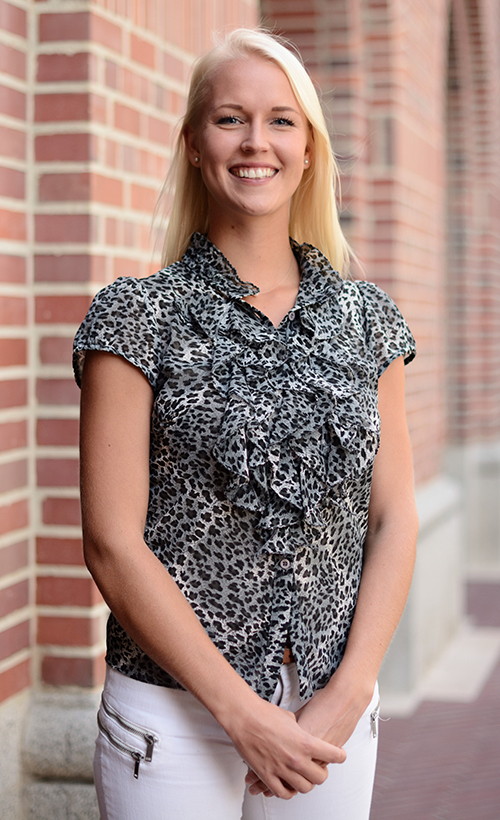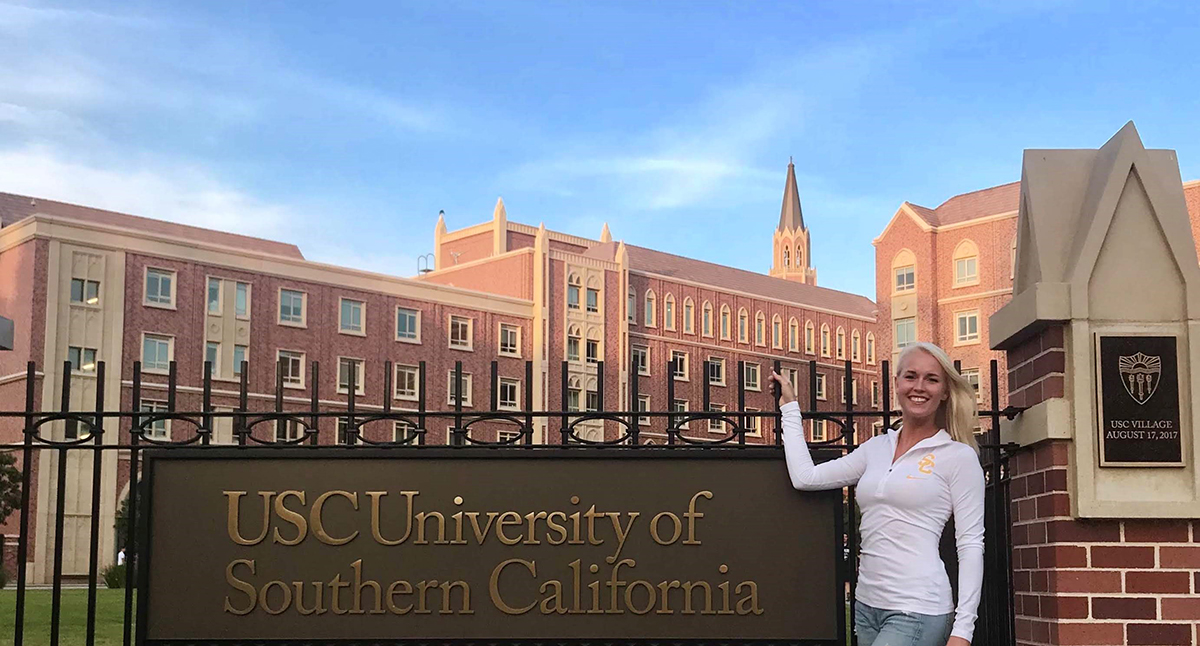Jessica Widmark moved to the US to pursue PhD studies at the University of Southern California
Jessica Widmark graduated from the master’s programme in Medical Engineering in 2018. She is now a PhD student working in a lab that focuses on helping children with cerebral palsy and movement disorders.

Hi Jessica, what are you doing at the moment?
I am currently a PhD student about to start my second year in the Biomedical Engineering programme at the University of Southern California in USA. I am part of a lab that focuses on helping children with cerebral palsy and movement disorders such as secondary dystonia. Many of our patients are treated using deep brain stimulation (DBS), a method that involves the implantation of and stimulation using small electrodes in deep brain regions that are related to the patient’s symptoms (in our case particularly in the basal ganglia). Small electrical stimulations in these electrodes, at particular frequencies and other stimulation parameters, have been found to improve the (originally erratic) cerebral activity in brain regions related to the patient’s disease, through a mechanism called neuromodulation. This can, in turn, greatly reduce many patients’ symptoms, e.g. helping children walk on their own, feed themselves, and live a more normal life. However, the stimulation plan and treatment results vary greatly from patient to patient, and the underlying mechanisms by which DBS can improve motor symptoms are not yet well known. Hence, my research aim is to understand what happens in the brain during DBS, particularly at different stimulation parameters, to shed light on this treatment method and aid in the design of personal and more successful stimulation protocols in the future.
What can a regular day look like at your job?
There are a lot of data recordings available from clinical testing of different DBS parameters, and these, together with future recordings, are the basis of my analysis. On a regular day in the office, I work independently in MATLAB, improving and running our analysis code on the available data in order to uncover the neural responses from the electrode recordings. When not in the office, I may be personally present in the Children’s Hospital of Los Angeles, attending meetings with patients and preparing stimulation protocols. The next couple of weeks, much of my focus will be on analysing the neural responses seen at different brain regions from varying stimulation frequencies, figuring out what these responses might mean, and putting my work into words for a future scientific publication.
Have you worked with anything else since you graduated?
The summer before starting this PhD programme, I collaborated with a research group at Linköping University (LiU), investigating if machine learning and pattern recognition techniques could be used to map particular characteristics of recordings of neural responses to their corresponding physical stimuli.
Why did you choose this programme at KTH?
Growing up in Sweden, I have always thought very highly of KTH. I have relatives who have graduated from the institute, which is also widely known to be one of the best engineering schools in Europe. In addition to this, KTH’s master’s programme in Medical Engineering has a unique collaboration with Karolinska Institutet (KI), and many options to study abroad and collaborate with other universities or companies for your master’s thesis. All combined, KTH was a clear first choice for me and I was thrilled when I got the acceptance letter!
Are there any insights or knowledge you acquired during your studies that have been extra useful for you in your career?
The best preparation for my PhD research was definitely my master’s thesis project, which I did in collaboration with a young mechanical prosthesis company in Urbana-Champaign in Illinois, USA. Not only was the thesis course designed so that we were very personally responsible for the planning and timely execution of our projects, but my work itself was also very independent and required a lot of self-motivation and accountability, which is very similar to my current situation as a PhD student. This thesis project definitely helped prepare me for this next step in my career.

What were the best aspects of your studies at KTH?
I loved that we were able to design our programmes individually - after the first semester (which had a fairly pre-set schedule), we had the choice between many classes, and were even able to branch out outside of our fields of study. This gave me the chance to gear my degree towards my personal medical engineering interests, which seemed to be a bit different from the norm.
What is your best memory from your time at the universities?
In my first semester, I volunteered for the Students’ Nobel Night Cap (SNNC), the (un)official afterparty of the Nobel Prize ceremony, together with some classmates. Every year, one university in Stockholm plans a very impressive afterparty for the ceremony, with the guest list including all the Nobel Prize guests as well as other well-known names - and that year (2016) KTH was the host. The 24 hours surrounding the party were insane - building and decorating a fascinating game-themed party venue in the dining hall of KTH in just 12 hours, hosting the party all night with nominees, laureates, and celebrities, and then tearing it all down right after. It was an amazing experience, worth all the hard work. I slept for 18 hours straight after it was all over.
What are your plans for the future?
Once I obtain my PhD degree, I will have several different options of where to go next. I am intrigued by the possibility of staying in academia and becoming a professor: I love the thought of being able to both lead my own research group and teach at a university level. However, going into the industry and e.g. working on the research and development of a medical device at a big company, or even starting my own business, is enticing too! Although I can’t say what my future holds just yet, I can say I am excited for it.
What would you want to say to a student thinking of applying for this programme?
In addition to obtaining a valuable degree from a respected university, you’ll meet friends for life at KTH, while getting to enjoy the beauty of Stockholm. You’ve got nothing at all to lose, but everything to gain. Do it. Apply!
